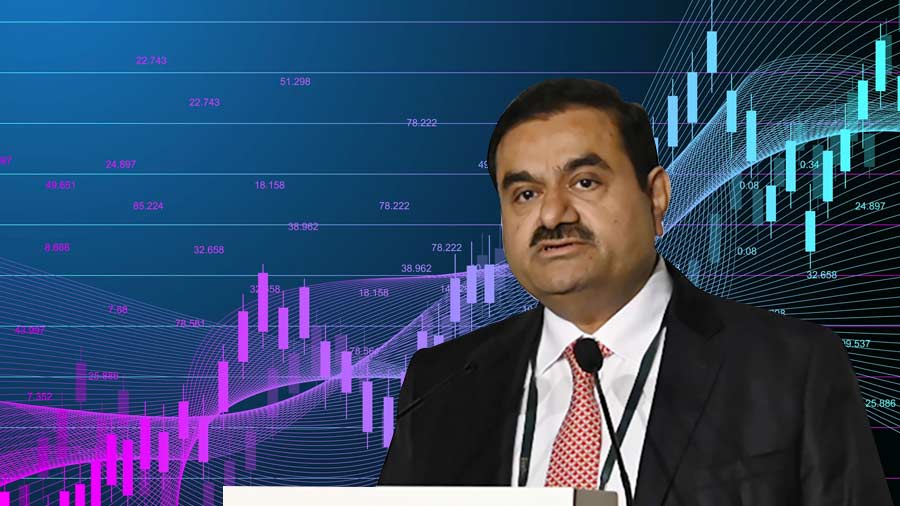Gautam Adani's crucial $2.5 billion share sale achieved a full subscription on Tuesday as investors pumped funds into his flagship Adani Enterprises, despite a scathing short-seller's report which had pummelled the Indian billionaire's stocks.
The share sale is critical for Adani, not just because it will help cut his group's debt, but also because its success will be seen as a mark of investor confidence as he faces one of his biggest business and reputational challenges.
Although the 30 per cent anchor portion of the issue had been subscribed fully last week, the book building process of India's largest secondary share sale had only 3 per cent in bids on Monday, amid concerns it could struggle due to the rout in Adani's stocks.
But on Tuesday, the overall share sale was fully subscribed as foreign institutional investors and corporates pumped in funds, although participation by retail investors and Adani Enterprises employees remained low.
Investors would view the successful completion of the FPO (follow-on public offering) as a welcome relief, as it implies that the company still has the support of institutional investors,” Leonard Law, Senior Credit Analyst at Lucror Analytics Singapore, said on Tuesday.
"The FPO would help to enlarge Adani Enterprises' public float (thereby partly addressing the issue over the promoters concentrated shareholding), as well as reduce leverage for the company and improve investor sentiment,” Law added.
The offer closes days after Adani's public face-off with Hindenburg Research, which last week flagged concerns about the use of tax havens and “substantial debt” at the group. It added that shares in seven Adani listed companies have an 85% downside due to what it called“sky-high valuations”.
That sparked $65 billion in cumulative losses for stocks of the Adani group, which called the report baseless.
The support for Adani's share sale came even as the flagship's shares closed at 2,973.9 rupees, up nearly 3 per cent but below the lower end of the sale price band of 3,112 rupees.
Adani Group's total gross debt in the financial year ended March 31, 2022, rose 40 per cent to 2.2 trillion rupees ($26.83 billion). Adani said on Sunday in response to Hindenburg's allegations that over the past decade the group has consistently de-levered.
Adani even said the Hindenburg report was a “calculated attack” on India and its institutions while its CFO compared the market rout of its stocks to a colonial-era massacre.
Hindenburg later said Adani's “response largely confirmed our findings and ignored our key questions.”
Adani had in recent days repeatedly said investors were standing by its side and the share offering would go through. Bankers at one point had considered tweaking the pricing of the issue, or extending the sale, Reuters had reported.
Demand from retail investors garnered bids only worth around 10 per cent of the shares on offer for that segment. Demand mostly came from foreign institutional investors, as well as corporates who bid in excess of 1 million rupees each, data showed.
Over the weekend and through Monday, Adani's firm held extensive discussions with investment bankers and institutional investors to attract subscriptions, according to two sources with direct knowledge of the talks.
Abu Dhabi conglomerate International Holding Company said it will invest $400 million in the issue.
The Hindenburg report and its fallout have drawn global attention. Adani is now the world's eighth richest person, down from third ranking on Forbes' rich list last week.
Adani Transmission closed nearly 4% higher on Tuesday after losing 38 per cent since the Hindenburg report, while Adani Ports and Special Economic Zone climbed 2.6 per cent.
Adani Total Gas closed down 10 per cent at its lower price limit, while Adani Power and Adani Wilmar were down 5 per cent each.
Global index publisher FTSE Russell said on Tuesday it continues to monitor publicly available information on the group, in particular from the Indian regulatory authorities.
Hindenburg said in its report it had shorted U.S.-bonds and non-India traded derivatives of the Adani Group. On Tuesday, U.S. dollar-denominated bonds issued by Adani Ports and Special Economic Zone continued their fall into a second week.











